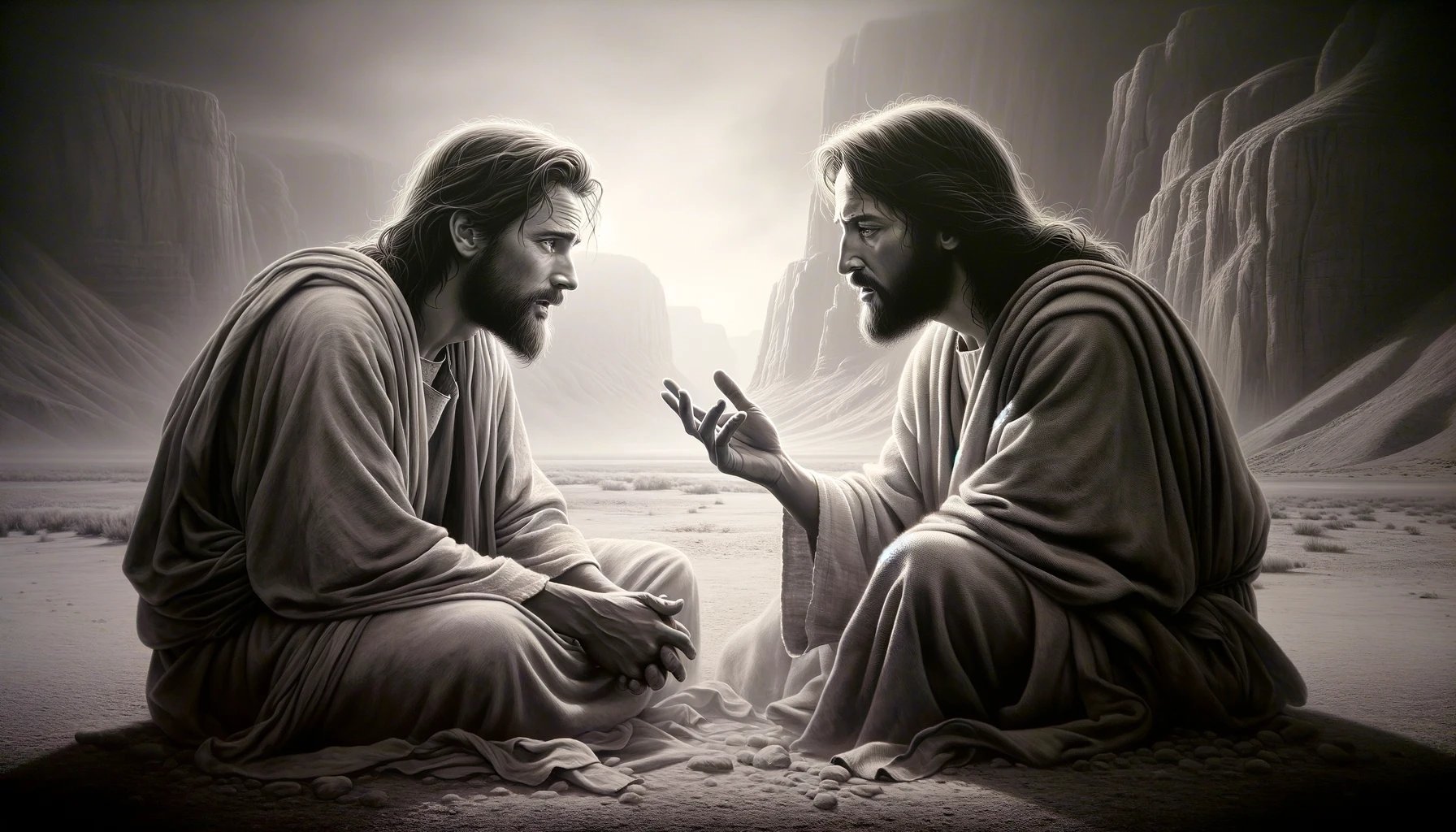Home>Christian Videos>Bible Stories>What Does Buddhism Say About Jesus Christ


Bible Stories
What Does Buddhism Say About Jesus Christ
Published: March 3, 2024
Jason DeRose, Managing Editor at Christian.net, uses his expertise in religion and journalism to deepen understanding of faith's societal impacts. His editorial leadership, coupled with a strong academic background, enriches the platform’s diverse content, earning him recognition in both journalism and religious circles.
Discover what Buddhism teaches about Jesus Christ and explore the connections between Buddhist beliefs and Bible stories. Gain insight into the perspectives of Buddhism on the figure of Jesus.
(Many of the links in this article redirect to a specific reviewed product. Your purchase of these products through affiliate links helps to generate commission for Christian.net, at no extra cost. Learn more)
Table of Contents
Introduction
What does Buddhism say about Jesus Christ? This is a question that has intrigued many individuals seeking to understand the intersection of different religious beliefs. The relationship between Buddhism and Christianity, particularly in relation to the figure of Jesus Christ, is a topic of interest for those exploring the diversity of religious thought. In this article, we will delve into the historical context of Jesus Christ in Buddhism, explore the Buddhist perspective on Jesus Christ, compare the teachings of Jesus Christ and Buddhism, and examine the influence of Jesus Christ on Buddhist thought. Through this exploration, we aim to shed light on the connections and disparities between these two influential religious traditions.
Read more: What Does The Quran Say About Jesus Christ
The Historical Context of Jesus Christ in Buddhism
-
Absence in Early Buddhist Texts: The historical context of Jesus Christ in Buddhism is an intriguing subject, as there is no direct mention of Jesus in the early Buddhist texts. The teachings of Buddhism, which originated in India, predate the birth of Jesus Christ in the Middle East. Therefore, the figure of Jesus does not appear in the foundational scriptures of Buddhism, such as the Pali Canon.
-
Later Encounters: It was not until several centuries after the time of the Buddha that Buddhist communities came into contact with Christian missionaries and traders. These encounters led to the exchange of religious ideas and the potential for the integration of Jesus Christ into the religious consciousness of some Buddhist communities.
-
Influence of Cultural Exchange: As Buddhism spread to different regions, such as Central Asia and China, it encountered diverse cultural and religious influences. This led to the assimilation of local beliefs and figures into Buddhist thought. In some cases, the figure of Jesus Christ may have been interpreted through the lens of Buddhist concepts and integrated into local religious practices.
-
Artistic Representations: In certain Buddhist cultures, artistic representations of Jesus Christ have been found in the form of paintings and sculptures. These depictions often reflect a blending of Buddhist artistic styles with the portrayal of Jesus, indicating a cultural and artistic exchange between Buddhism and Christianity.
-
Historical Interpretations: Scholars and historians have also explored the historical context of Jesus Christ in relation to Buddhist societies. Through the study of archaeological evidence and textual sources, they have sought to understand the ways in which the figure of Jesus may have been perceived and interpreted within Buddhist communities.
-
Interfaith Dialogue: In contemporary times, the historical context of Jesus Christ in Buddhism has become a subject of interfaith dialogue and scholarly inquiry. This dialogue aims to foster understanding and mutual respect between Buddhist and Christian practitioners, as well as to explore the intersections of their respective religious narratives.
Through an examination of the historical context of Jesus Christ in Buddhism, we gain insight into the complex dynamics of religious interaction and the ways in which diverse traditions have influenced each other over time.
The Buddhist Perspective on Jesus Christ
-
Non-Divine Teacher: From a Buddhist perspective, Jesus Christ is often viewed as a remarkable teacher and moral exemplar rather than a divine figure. In Buddhist thought, the emphasis is placed on the potential for enlightenment within all beings, and Jesus may be seen as embodying the qualities of wisdom, compassion, and selflessness that are revered in Buddhist teachings.
-
Universal Compassion: The Buddhist perspective on Jesus Christ also highlights his message of universal compassion and love for all beings. This resonates with the Buddhist principle of mettā, or loving-kindness, which forms a core aspect of Buddhist ethical conduct and spiritual practice. Jesus' teachings on forgiveness and the alleviation of suffering are seen as aligning with the compassionate ethos of Buddhism.
-
Impermanence and Interconnectedness: Within Buddhist philosophy, the concepts of impermanence and interconnectedness are central to understanding the nature of existence. From this perspective, the life and teachings of Jesus Christ may be interpreted as illustrating the impermanence of worldly existence and the interconnectedness of all beings. This philosophical alignment allows for a nuanced appreciation of Jesus' role within the framework of Buddhist thought.
-
Rejection of Dogma: Buddhism's emphasis on personal inquiry and the rejection of dogma allows for a flexible and open-minded approach to the figure of Jesus Christ. Rather than imposing rigid theological interpretations, the Buddhist perspective encourages individuals to engage with the moral and spiritual dimensions of Jesus' teachings in a way that resonates with their own spiritual journey.
-
Interfaith Dialogue and Understanding: In contemporary Buddhist communities, there is a growing interest in engaging with the figure of Jesus Christ through the lens of interfaith dialogue and understanding. This perspective seeks to appreciate the ethical and moral teachings of Jesus while acknowledging the diversity of religious expressions and interpretations.
-
Cultural Variations: It is important to note that the Buddhist perspective on Jesus Christ may vary across different cultural and geographical contexts. In regions where Buddhism has interacted with Christianity, such as in East Asia, there may be unique interpretations of Jesus' significance within the framework of Buddhist beliefs and practices.
-
Symbolic Interpretations: Some Buddhist practitioners may view Jesus Christ as a symbolic representation of universal virtues and spiritual truths rather than as a historical or theological figure. This symbolic approach allows for a harmonious integration of Jesus' teachings with the broader tapestry of Buddhist wisdom.
By exploring the Buddhist perspective on Jesus Christ, we gain a deeper understanding of the diverse ways in which religious traditions intersect and inform each other, fostering a spirit of mutual respect and dialogue.
Comparing the Teachings of Jesus Christ and Buddhism
-
Compassion and Love: Both the teachings of Jesus Christ and Buddhism emphasize the importance of compassion and love. Jesus' message of loving one's neighbor as oneself and showing mercy to others resonates with the Buddhist principle of mettā, or loving-kindness. In Buddhism, the cultivation of compassion towards all beings is considered essential for spiritual development, reflecting a shared emphasis on universal love and empathy.
-
Forgiveness and Redemption: Jesus' teachings on forgiveness and the redemption of sinners find parallels in the Buddhist concept of karmic purification and the potential for spiritual transformation. Both traditions emphasize the possibility of liberation from past wrongdoings and the capacity for inner renewal through acts of forgiveness and ethical conduct.
-
Humility and Selflessness: The humility and selflessness exemplified in Jesus' life and teachings align with the Buddhist ideal of non-attachment and the recognition of the transient nature of worldly existence. Both traditions emphasize the value of selfless service, humility, and the relinquishment of ego-centered desires as pathways to spiritual growth and ethical living.
-
Inner Peace and Liberation: Jesus' invitation to find rest for the soul and experience spiritual liberation resonates with the Buddhist goal of attaining inner peace and transcending the cycle of suffering. Both traditions offer teachings on the alleviation of mental anguish, the pursuit of inner harmony, and the quest for ultimate liberation from the bonds of suffering and ignorance.
-
Ethical Conduct and Moral Virtue: The ethical teachings of Jesus Christ, as expressed in the Sermon on the Mount and other passages, share common ground with the ethical precepts and virtues upheld in Buddhism. Both traditions advocate for honesty, compassion, generosity, and the cultivation of moral integrity as essential aspects of a virtuous life and a harmonious society.
-
Teachings on Impermanence and Transcendence: The recognition of impermanence and the transient nature of worldly existence is a central theme in both the teachings of Jesus Christ and Buddhism. Jesus' teachings on the ephemeral nature of material possessions and the pursuit of spiritual treasures align with the Buddhist emphasis on the impermanence of all phenomena and the pursuit of transcendent wisdom beyond the fleeting aspects of life.
-
Universal Truth and Spiritual Awakening: Both Jesus Christ and the Buddha conveyed teachings that point towards universal truths and the potential for spiritual awakening. Their messages transcend cultural and religious boundaries, offering insights into the nature of reality, the human condition, and the transformative power of spiritual realization.
By comparing the teachings of Jesus Christ and Buddhism, we recognize the shared ethical and spiritual values that underpin these traditions, fostering a deeper appreciation of their common aspirations for human flourishing and the alleviation of suffering.
The Influence of Jesus Christ on Buddhist Thought
The influence of Jesus Christ on Buddhist thought is a subject that invites contemplation on the ways in which religious figures and teachings can intersect and inspire diverse spiritual perspectives. While Buddhism predates the historical emergence of Jesus Christ, the encounter with Christian ideas and the figure of Jesus has left an indelible mark on certain strands of Buddhist thought and practice.
-
Interfaith Dialogue and Syncretism: The encounter with Christian missionaries and traders in regions where Buddhism had taken root led to the exchange of religious ideas and the potential for syncretism. This interaction gave rise to the assimilation of certain Christian concepts and the figure of Jesus Christ into the religious landscape of some Buddhist communities. As a result, elements of Christian thought may have influenced the development of certain Buddhist beliefs and practices, leading to a rich tapestry of interfaith dialogue and cultural exchange.
-
Artistic and Cultural Expressions: The influence of Jesus Christ on Buddhist thought is also evident in artistic and cultural expressions. In regions where Buddhism and Christianity coexisted, artistic representations of Jesus Christ have been found in the form of paintings, sculptures, and iconography. These artistic depictions often reflect a blending of Buddhist and Christian artistic styles, indicating a cultural fusion that speaks to the diverse influences shaping religious expression.
-
Ethical and Moral Teachings: The ethical and moral teachings attributed to Jesus Christ have resonated with certain Buddhist communities, leading to the integration of Christian ethical principles into the ethical framework of Buddhism. Concepts such as love, compassion, forgiveness, and the pursuit of justice, as exemplified in the teachings of Jesus, have found parallels in the ethical precepts and moral virtues upheld in Buddhist teachings. This cross-pollination of ethical ideals has enriched the ethical discourse within Buddhist thought.
-
Philosophical Exchange: The philosophical themes present in the teachings of Jesus Christ, such as the nature of suffering, the pursuit of inner peace, and the quest for spiritual liberation, have intersected with key tenets of Buddhist philosophy. The shared emphasis on the alleviation of human suffering, the cultivation of inner virtues, and the pursuit of transcendent wisdom has engendered a dialogue between Christian and Buddhist philosophical perspectives, contributing to a nuanced understanding of the human condition and the nature of spiritual realization.
-
Cultural Adaptation and Interpretation: In regions where Buddhism encountered Christian influence, the figure of Jesus Christ may have been culturally adapted and interpreted within the framework of Buddhist beliefs and practices. This cultural adaptation allowed for a unique expression of Jesus' significance within the religious consciousness of certain Buddhist communities, reflecting the dynamic nature of religious syncretism and cultural exchange.
-
Historical and Scholarly Inquiry: Scholars and historians have engaged in the study of the historical and cultural impact of Jesus Christ on Buddhist thought. Through the examination of textual sources, archaeological evidence, and historical records, they have sought to understand the ways in which the figure of Jesus has been perceived, interpreted, and integrated within the religious narratives of Buddhist societies.
The influence of Jesus Christ on Buddhist thought exemplifies the dynamic nature of religious interaction and the capacity for diverse traditions to inform and inspire each other. This influence has contributed to the rich tapestry of religious diversity and the ongoing dialogue between different faith traditions, fostering a spirit of mutual understanding and appreciation for the interconnectedness of human spiritual experience.
Conclusion
In conclusion, the exploration of what Buddhism says about Jesus Christ reveals a complex tapestry of historical, philosophical, and cultural interactions between these two influential religious traditions. While the figure of Jesus Christ does not appear in the early Buddhist texts, the historical context of Jesus in Buddhism reflects the dynamic nature of religious exchange and the potential for cross-cultural influence. The Buddhist perspective on Jesus Christ emphasizes his role as a moral exemplar and teacher, highlighting the universal values of compassion, love, and ethical conduct that resonate with Buddhist teachings. By comparing the ethical and spiritual themes in the teachings of Jesus Christ and Buddhism, we recognize the shared aspirations for human flourishing and the alleviation of suffering. The influence of Jesus Christ on Buddhist thought is evident in the realms of interfaith dialogue, artistic expression, ethical discourse, philosophical exchange, and cultural adaptation, reflecting the capacity for diverse religious traditions to inform and inspire each other. Through this exploration, we gain a deeper understanding of the interconnectedness of human spiritual experience and the potential for mutual respect and dialogue across religious boundaries.














